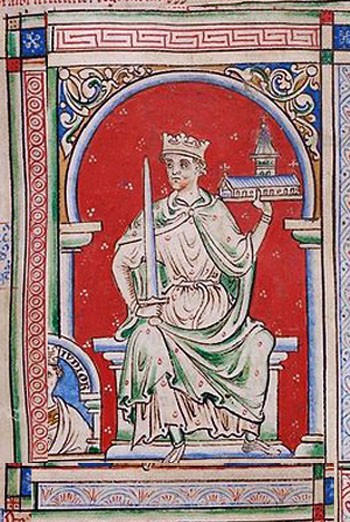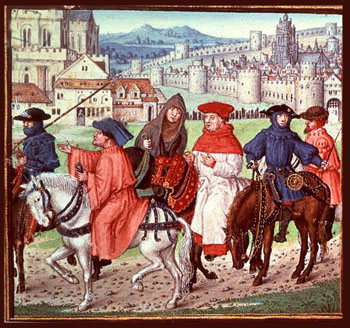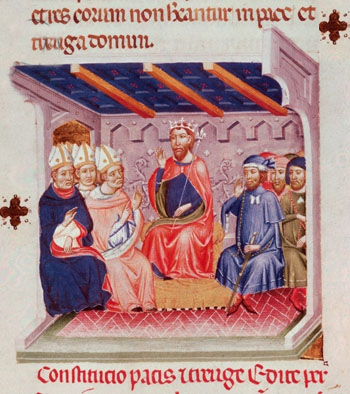Organic Society
 |
 |
 |
 |
 |
 |
 |
Medieval Written Law - I
Privileges & Royal Establishments
In the last series we dealt with the customs, examining how customs were established and when they were legitimate or not. We also explained the role of the King in face of customs, showing that the function of the King or, in certain cases, the feudal lord was to confirm and protect good customs.
When, in a given social class or category of workers there was a doubt whether a custom were legitimate, then the King intervened to define the good customs and prevent the bad ones. At other times, the customs were codified in written documents and presented by the interested classes for the confirmation of the King. So, the King had the role of confirming good customs and extirpating bad ones.
A custom, indeed, could only have value insofar as it were in accord with justice and the natural order. If it were not, then it was an obligation of the King to abolish it. King St. Louis IX of France, as we have already shown, was a model extirpator of bad customs.
Besides those non-written laws that were the customs, there were also the written laws in the Middle Ages. As we begin this series, we will start to analyze how these laws were constituted. There were basically two types of civil laws: those made by the King and those established by the feudal lords.
First, let us look at the laws made by the King.
The privileges
As the supreme judge of the Kingdom, as a man who oversees justice in all situations, the King had the power to dispense with the customs of certain persons in exceptional cases.
 Let us say, for example, in a region of Aragon, a custom was established that the families of the vassals of the surrounding villages would give the feudal lord on his birthday an honorific tribute of three roses, four loaves of breads and two dozens of eggs. This custom obliged all the families to pay such a tribute since time immemorial.
Let us say, for example, in a region of Aragon, a custom was established that the families of the vassals of the surrounding villages would give the feudal lord on his birthday an honorific tribute of three roses, four loaves of breads and two dozens of eggs. This custom obliged all the families to pay such a tribute since time immemorial.
But, let us suppose that a man in one of these families became so distinguished for his deeds in the service of the Kingdom and so elevated in his culture that he became a minister of State or a general. The family, consequently, became so illustrious that it would be inconvenient and even humiliating for its members to continue to follow that custom. So, the King would intervene by issuing a privilege to exempt that family from paying the honorific tribute to a feudal lord who was not as illustrious as that family.
Another hypothetical case: According to a custom, everyone who used a road passing through the lands of the Lord of Norfolk in England had to pay a toll for its upkeep. However, in the village church along that road a miracle took place, and this caused the number of pilgrims traveling there to increase enormously. The King would intervene with a privilege and dispense the pilgrims who were going to that church from paying the toll.
The customs, in those cases, did not take into consideration these new situations that arose. So, in order to accommodate those situations and reestablish full justice, the King would intervene and institute a privilege.
You should note that the word privilege later acquired a negative connotation, created by the demagogy of the revolutionaries. They portrayed privileges as favors granted by the King for persons who did not deserve them. Nothing is further from the reality than this.
In fact, it was precisely the opposite. The privilege was a way to re-establish justice. It is a well known maxim that the law is blind, signifying that it is a general rule that does not consider exceptions. For the exceptional situations that always arise, the King, for the sake of justice, would accommodate the law to those concrete situations by granting privileges. This was one of the higher functions of the King.
The royal establishments
In addition to privileges, there were laws that the King would make for the whole Kingdom. In French Law they were called les établissements nouveaux, the new establishments, which we will call the royal establishments here. They were called establishments because they were decrees that created new situations for the entire Kingdom. They were promulgated by the King of France and supported by his highest nobles and feudal lords.
 Generally speaking, they were good, written in a beautiful form, in which the King declared, for example: “Having heard our faithful vassals, the Duke of Normandy, the Duke of Bretagne and the Duke of Anjou, who were gathered with us in our Court on such and such a day, we have determined to issue for the whole Kingdom of France the following decree.” And, then, the text would follow.
Generally speaking, they were good, written in a beautiful form, in which the King declared, for example: “Having heard our faithful vassals, the Duke of Normandy, the Duke of Bretagne and the Duke of Anjou, who were gathered with us in our Court on such and such a day, we have determined to issue for the whole Kingdom of France the following decree.” And, then, the text would follow.
Did the King of France need the approval of the feudal Lords to issue measures of this kind?
I believe that here we find a point that not all scholars of Medieval Law understand well. They generally affirm that the King did not need the approval of the Lords and offer as a proof that at times the King would make a decree without the feudal Lords. They then deduce that the Kings could govern without the great nobles.
I believe that they missed a fundamental point regarding the different situations that were being addressed. Some measures of collective interest belonged to the executive function of the King, and so he would issue decrees in those fields without the concord of the feudal Lords. However, at other times, there were measures that fell in the ambit of the feudal Lords and, then, for the good of the Kingdom they would all decide and legislate together with the King.
I have the impression that if the scholars of Medieval Law knew Canon Law a little better, they would avoid many errors and imprecisions in this regard.
 In the Church these different situations also exist. There are decrees that the Pope issues alone, but there are other decrees that concern the jurisdictions of the Bishops. In principle, the Pope could legislate alone on these matters also, but normally he does not. The Bishops meet to deal with this or that topic, and then issue the decrees they determine. Then, the Pope receives their decisions, approves them and orders that they be put into practice. An analogous situation existed in the temporal sphere in the Middle Ages.
In the Church these different situations also exist. There are decrees that the Pope issues alone, but there are other decrees that concern the jurisdictions of the Bishops. In principle, the Pope could legislate alone on these matters also, but normally he does not. The Bishops meet to deal with this or that topic, and then issue the decrees they determine. Then, the Pope receives their decisions, approves them and orders that they be put into practice. An analogous situation existed in the temporal sphere in the Middle Ages.
We should distinguish, therefore, that in the laws made by the King for the common good of the Kingdom, there were laws that fell within the exclusive ambit of the King’s competence and laws in the ambit of the competence of the feudal Lords. When it was convenient for the Lords to legislate together with the King, they did so, and in such cases we say that they legislated together. But when it was a matter where the King did not need to hear the others, then he would decide by himself.
In France the oldest royal establishment known is from 1144. It is an act by which King Louis VII ordered the expulsion of all relapsed Jews from French soil. At that time a relapsed Jew was understood as the Jew who had embraced the Catholic Religion by fraud to obtain some advantage, and then later abandoned the Faith. These were the Jews whom Louis VII ordered out of France.
Six years later, in 1150, a decree was issued for the whole of France, which established a 10 year period of peace in the Kingdom in favor of three categories: the churches, the merchants and those who cultivated the land. The King made this peace to prevent the private wars from causing chaos in the lives of these three sectors of society.
In Medieval Law such written laws of the King were extremely rare. Later on, they became more frequent. By the end of the Middle Ages, the Kings legislated much more on a large number of matters.
Continued

When, in a given social class or category of workers there was a doubt whether a custom were legitimate, then the King intervened to define the good customs and prevent the bad ones. At other times, the customs were codified in written documents and presented by the interested classes for the confirmation of the King. So, the King had the role of confirming good customs and extirpating bad ones.
A custom, indeed, could only have value insofar as it were in accord with justice and the natural order. If it were not, then it was an obligation of the King to abolish it. King St. Louis IX of France, as we have already shown, was a model extirpator of bad customs.
Besides those non-written laws that were the customs, there were also the written laws in the Middle Ages. As we begin this series, we will start to analyze how these laws were constituted. There were basically two types of civil laws: those made by the King and those established by the feudal lords.
First, let us look at the laws made by the King.
The privileges
As the supreme judge of the Kingdom, as a man who oversees justice in all situations, the King had the power to dispense with the customs of certain persons in exceptional cases.

The King had the role of defending justice & the Church
But, let us suppose that a man in one of these families became so distinguished for his deeds in the service of the Kingdom and so elevated in his culture that he became a minister of State or a general. The family, consequently, became so illustrious that it would be inconvenient and even humiliating for its members to continue to follow that custom. So, the King would intervene by issuing a privilege to exempt that family from paying the honorific tribute to a feudal lord who was not as illustrious as that family.
Another hypothetical case: According to a custom, everyone who used a road passing through the lands of the Lord of Norfolk in England had to pay a toll for its upkeep. However, in the village church along that road a miracle took place, and this caused the number of pilgrims traveling there to increase enormously. The King would intervene with a privilege and dispense the pilgrims who were going to that church from paying the toll.
The customs, in those cases, did not take into consideration these new situations that arose. So, in order to accommodate those situations and reestablish full justice, the King would intervene and institute a privilege.
You should note that the word privilege later acquired a negative connotation, created by the demagogy of the revolutionaries. They portrayed privileges as favors granted by the King for persons who did not deserve them. Nothing is further from the reality than this.
In fact, it was precisely the opposite. The privilege was a way to re-establish justice. It is a well known maxim that the law is blind, signifying that it is a general rule that does not consider exceptions. For the exceptional situations that always arise, the King, for the sake of justice, would accommodate the law to those concrete situations by granting privileges. This was one of the higher functions of the King.
The royal establishments
In addition to privileges, there were laws that the King would make for the whole Kingdom. In French Law they were called les établissements nouveaux, the new establishments, which we will call the royal establishments here. They were called establishments because they were decrees that created new situations for the entire Kingdom. They were promulgated by the King of France and supported by his highest nobles and feudal lords.

The King's privilege made exceptions to the law, such as lifting a road tax for pilgrims
Did the King of France need the approval of the feudal Lords to issue measures of this kind?
I believe that here we find a point that not all scholars of Medieval Law understand well. They generally affirm that the King did not need the approval of the Lords and offer as a proof that at times the King would make a decree without the feudal Lords. They then deduce that the Kings could govern without the great nobles.
I believe that they missed a fundamental point regarding the different situations that were being addressed. Some measures of collective interest belonged to the executive function of the King, and so he would issue decrees in those fields without the concord of the feudal Lords. However, at other times, there were measures that fell in the ambit of the feudal Lords and, then, for the good of the Kingdom they would all decide and legislate together with the King.
I have the impression that if the scholars of Medieval Law knew Canon Law a little better, they would avoid many errors and imprecisions in this regard.

King James I of Aragon issues a decree at Tortosa in 1225 to ensure the rights of Church, merchants & farmers
We should distinguish, therefore, that in the laws made by the King for the common good of the Kingdom, there were laws that fell within the exclusive ambit of the King’s competence and laws in the ambit of the competence of the feudal Lords. When it was convenient for the Lords to legislate together with the King, they did so, and in such cases we say that they legislated together. But when it was a matter where the King did not need to hear the others, then he would decide by himself.
In France the oldest royal establishment known is from 1144. It is an act by which King Louis VII ordered the expulsion of all relapsed Jews from French soil. At that time a relapsed Jew was understood as the Jew who had embraced the Catholic Religion by fraud to obtain some advantage, and then later abandoned the Faith. These were the Jews whom Louis VII ordered out of France.
Six years later, in 1150, a decree was issued for the whole of France, which established a 10 year period of peace in the Kingdom in favor of three categories: the churches, the merchants and those who cultivated the land. The King made this peace to prevent the private wars from causing chaos in the lives of these three sectors of society.
In Medieval Law such written laws of the King were extremely rare. Later on, they became more frequent. By the end of the Middle Ages, the Kings legislated much more on a large number of matters.
Continued

Posted November 19, 2014
Organic Society was a theme dear to the late Prof. Plinio Corrêa de Oliveira. He addressed this topic on countless occasions during his life - at times in lectures for the formation of his disciples, at times in meetings with friends who gathered to study the social aspects and history of Christendom, at times just in passing.
Prof. Plinio
Atila S. Guimarães selected excerpts of these lectures and conversations from the transcripts of tapes and his own personal notes. He translated and adapted them into articles for the TIA website. In these texts fidelity to the original ideas and words is kept as much as possible.
______________________
______________________












